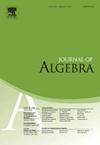三角形群的可溶性商
IF 0.8
2区 数学
Q2 MATHEMATICS
引用次数: 0
摘要
本文通过证明每个非完全双曲常三角形群 Δ+(p,q,r)=〈x,y|xp=yq=(xy)r=1〉都有一个派生长度为 c(某个 c≤3 )的光滑有限可溶商,以及派生长度为 d(每个 d>c 都有无穷多个这样的商),有助于解释可溶群在正则映射的自变群中(至少对 "小 "属而言)的普遍存在。本文章由计算机程序翻译,如有差异,请以英文原文为准。
Soluble quotients of triangle groups
This paper helps explain the prevalence of soluble groups among the automorphism groups of regular maps (at least for ‘small’ genus), by showing that every non-perfect hyperbolic ordinary triangle group has a smooth finite soluble quotient of derived length c for some , and infinitely many such quotients of derived length d for every .
求助全文
通过发布文献求助,成功后即可免费获取论文全文。
去求助
来源期刊

Journal of Algebra
数学-数学
CiteScore
1.50
自引率
22.20%
发文量
414
审稿时长
2-4 weeks
期刊介绍:
The Journal of Algebra is a leading international journal and publishes papers that demonstrate high quality research results in algebra and related computational aspects. Only the very best and most interesting papers are to be considered for publication in the journal. With this in mind, it is important that the contribution offer a substantial result that will have a lasting effect upon the field. The journal also seeks work that presents innovative techniques that offer promising results for future research.
 求助内容:
求助内容: 应助结果提醒方式:
应助结果提醒方式:


